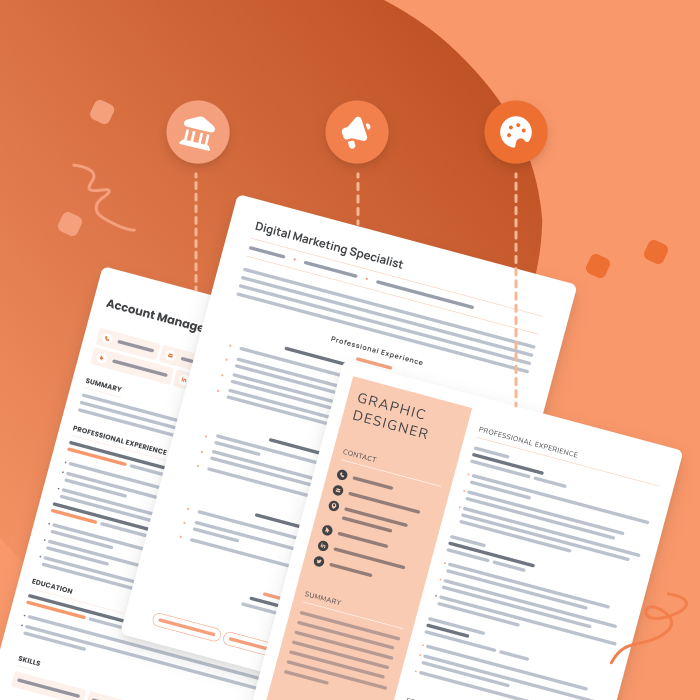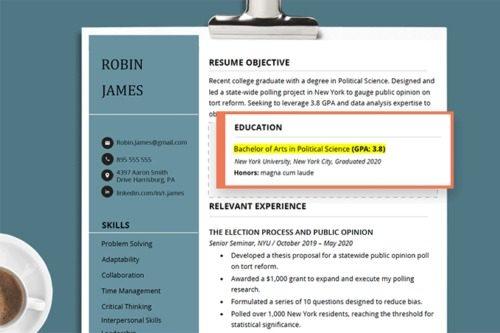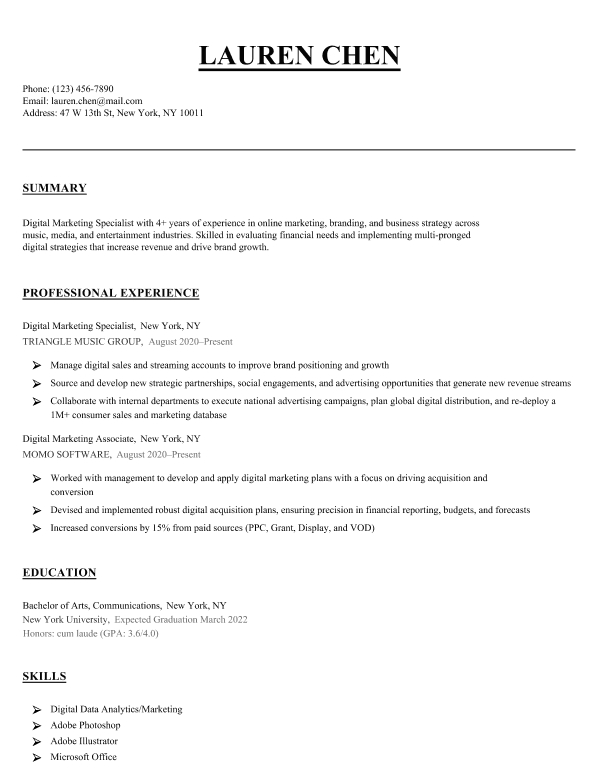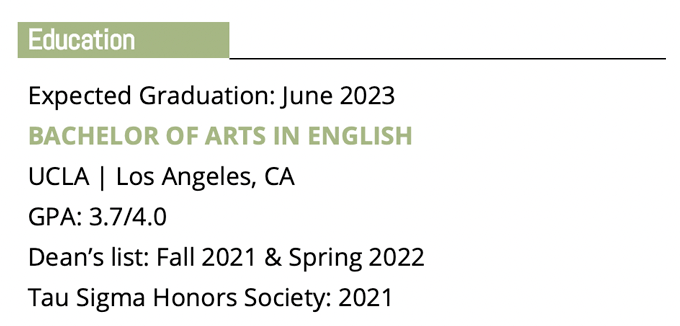In the right situations, including your GPA when you write your resume can impress employers. However, it’s not always a good idea. Learn when to put your GPA on your resume and how to do it the right way with examples to create a strong resume.
Our free-to-use resume builder can make you a resume in as little as 5 minutes. Just pick the template you want, and our software will format everything for you.
When should you include your GPA on your resume?
Every piece of information that you provide about your qualifications can impact an employer’s hiring decision. That’s why it’s crucial you know what to put on a resume to effectively communicate your qualifications.
Many job-seekers (especially students and recent graduates) end up asking themselves: should I put my GPA on my resume?
To make sure you get it right, here are three situations when you would include your GPA on your resume:
1. If you’re still in high school or college
Students pick up a variety of skills in school that employers value but if you’re still in school, chances are you have little or no formal work experience.
In this case, your GPA is relevant because it helps an employer assess your work ethic and competency.
Employers know that graduating with a strong GPA is no easy task. By including it, you immediately communicate to employers that you have the ambition and expertise needed to excel.
However, only include your GPA on your resume if it’s 3.5 or above. Anything lower won’t work in your favor.
2. You’re a recent graduate
If you’re writing a recent college graduate resume, your GPA is relevant unless you already have substantial work experience to highlight. Your GPA gives employers a better sense of your abilities when it comes to your:
- Work ethic
- Productivity
- Time management skills
- Ability to juggle competing priorities
3. A company asks for it
You should always put your GPA on your resume if an employer asks for it or if it’s required in the job listing.
If you don’t include your GPA in this situation, it might seem like you have difficulty following instructions, which could hurt your chances of landing the job.

Resume examples for different industries
Not sure what your resume should look like? The best way to learn is by taking inspiration from resume examples written by other candidates in your industry.
When should you not include your GPA on your resume?
There are two situations when you should not include your GPA on your resume:
- When you have work experience
Once you gain 2-3 years of work experience, it’s best to remove your GPA from your resume and focus on what employers want to see: relevant work experience. As a young working professional, your old GPA won’t speak about your skills or current qualifications.
- When your GPA is lower than 3.5
If your GPA is average or below average, it’s best to leave it off your resume and bring attention to notable achievements and relevant coursework on your resume instead.
Where to put your GPA on your resume
Your resume format is more important than you might think, so be sure to select a resume template that follows the right format according to your level of work experience and skills.
Put your GPA in the education section of your resume, alongside any other academic achievements or honors.
Make sure that you follow the proper format by listing your GPA either following the name of your degree, after an honors mention, or on its own line, like in the following example:
Additionally, place your education section at the top of your resume if you have minimal work experience, like this high school student looking for a job:

To highlight your strong GPA, you can also include it in your resume objective, placed at the top of your resume underneath your resume header. This is the first thing employers are likely to read, so you’ll be sure to start your resume off strong.
How to put your GPA on your resume
Adding your resume GPA will only impress employers if you do it the right way. Here’s how to include your GPA on your resume:
Use your major GPA (if your overall GPA is lower)
If the GPA for your major is higher than your overall GPA, put that on your resume instead. Just be sure to make the distinction clear by listing it as your “major GPA.” If both numbers are impressive, you can include two GPAs on your resume.
If you’re putting a double major on your resume, listing the GPA for the most relevant course for the job is acceptable if it’s higher than your cumulative GPA — but make sure you clarify it’s not your cumulative GPA.
Pair it with other academic accomplishments
It’s worth listing any awards, accomplishments, or academic honors like cum laude on your resume that you achieved alongside your GPA. Place these under your education section below your GPA, college name, and degree.
A user-friendly resume builder will typically prompt you to add extra details to your education section, such as your GPA.
Don’t lie about your GPA
Even if your GPA is above 3.5, avoid lying about your GPA on your resume. Employers can check your transcript and can easily find out you’ve been dishonest about your education history. In this case, they might disqualify your application as a result.
If your GPA is low or an employer hasn’t requested it, simply leave it out. Even if you lie and still get the job, an employer might terminate you for being dishonest during the hiring process once they find out. Ultimately, it’s never worth the risk of lying on your resume.
Examples of how to include GPA on your resume
Here are a few tips to choose the correct format to list your GPA on your resume:
- You can list both your overall and major GPA
- If you’re using your major GPA, label it clearly
- You can list your overall GPA on its own line
- Place your GPA in parenthesis next to your honors
GPA on Resume Example #1
How to Include GPA on Your Resume
Bachelor of Science, University of Connecticut
Major: Environmental Science (Major GPA 3.8)
Magna Cum Laude (Overall GPA 3.6)
GPA on Resume Example #2
How to Include GPA on Your Resume
Bachelor of Arts, Oberlin College
Major: English Literature
GPA: 3.78
GPA on Resume Example #3
How to Include GPA on Your Resume
Bachelor of Arts in Peace Studies
American University
Summa Cum Laude (GPA 3.7)
Click to rate this article
4.1 Average rating

















